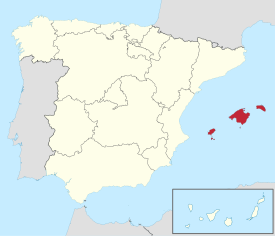
Back Baleariese Eilande Afrikaans ባሌያሪክ ደሴቶች Amharic Islas Balears AN Baleares ANG جزر البليار Arabic جزر البليار ARZ Islles Baleares AST Balear adaları Azerbaijani بالئار آدالاری AZB Kapuloan Balears BAN
Balearic Islands
| |
|---|---|
| Anthem: La Balanguera | |
 Location of the Balearic Islands east of mainland Spain | |
| Coordinates: 39°30′N 3°00′E / 39.500°N 3.000°E | |
| Country | |
| Largest city | Palma |
| Capital | Palma |
| Government | |
| • Type | Devolved government in a constitutional monarchy |
| • Body | Govern de les Illes Balears |
| • President | Marga Prohens (PP) |
| Area | |
| • Total | 5,040 km2 (1,950 sq mi) |
| • Rank | 17th (1.0% of Spain) |
| Population (Census 2021) | |
| • Total | 1,183,415 |
| • Density | 230/km2 (610/sq mi) |
| • Pop. rank | 14th (2.3% of Spain) |
| Demonym(s) | Balearic balear (m/f) |
| GDP | |
| • Total | €35.465 billion (2022) |
| • Per capita | €29,603 (2022) |
| Time zone | UTC+1 (CET) |
| • Summer (DST) | UTC+2 (CEST) |
| ISO 3166 code | ES-IB |
| Area code | +34 971 |
| Official languages | |
| Statute of Autonomy | 1 March 1983 1 March 2007 |
| Parliament | Balearic Parliament |
| Congress | 8 deputies (out of 350) |
| Senate | 7 senators (out of 266) |
| Website | www |
| 1.^ According to the current legislation the official name is in Catalan, Illes Balears. | |
The Balearic Islands (Catalan: Illes Balears [ˈiʎəz bəleˈas]; Spanish: Islas Baleares[2][3][4] [ˈislas βaleˈaɾes] /ˌbæliˈærɪk/ BAL-ee-ARR-ik or /bəˈlɪərɪk/ bə-LEER-ik[5][6]) are an archipelago in the western Mediterranean Sea, near the eastern coast of the Iberian Peninsula. The archipelago conforms a province and autonomous community of Spain, with Palma de Mallorca being its capital and largest city.
Formerly part of the Kingdom of Mallorca, the islands conformed a province in the 19th century provincial division, which in 1983 received a Statute of Autonomy. In its later reform of 2007, the Statute designates the Balearic Islands as one of the nationalities of Spain.[7] The official languages of the Balearic Islands are Catalan and Spanish.
The archipelago islands are further grouped in western Pytiuses (the largest being Ibiza and Formentera), and eastern Gymnesians (the largest being Mallorca and Menorca). Many of its minor islands and islets are close to the larger islands, including Cabrera, Dragonera, and S'Espalmador.
The islands have a Mediterranean climate, and the four major islands are all popular tourist destinations. Ibiza, in particular, is known as an international party destination, attracting many of the world's most popular DJs to its nightclubs.[8] The islands' culture and cuisine are similar to those of the rest of Spain but have their own distinctive features.
- ^ "Contabilidad Regional de España" (PDF). www.ine.es.
- ^ "Ley 3/1986, de 19 de abril, de normalización linguística". Boe.es. Archived from the original on 22 October 2007. Retrieved 7 July 2012.
- ^ "Ley 13/1997, de 25 de abril, por la que pasa a denominarse oficialmente Illes Balears la Provincia de Baleares". Boe.es. Archived from the original on 22 October 2007. Retrieved 7 July 2012.
- ^ "Ley Orgánica 1/2007, de 28 de febrero, de reforma del Estatuto de Autonomía de las Illes Balears". Boe.es. Archived from the original on 22 October 2007. Retrieved 7 July 2012.
- ^ Wells, John C. (2008). Longman Pronunciation Dictionary (3rd ed.). Longman. ISBN 978-1-4058-8118-0.
- ^ Roach, Peter (2011). Cambridge English Pronouncing Dictionary (18th ed.). Cambridge: Cambridge University Press. ISBN 978-0-521-15253-2.
- ^ Estatut d'Autonomia de les Illes Balears, Llei Orgànica 1/2007, article 1r
- ^ "The Party Island of Ibiza". www.vice.com.
© MMXXIII Rich X Search. We shall prevail. All rights reserved. Rich X Search

